De Nederlandse dichter Ed Leeflang werd geboren op 21 juni 1929 in Amsterdam. Zie ook alle tags voor Ed Leeflang op dit blog.
Voor de sopraan
Een vrolijke familie de pioenen,
van de bollebozen die geen leed verkroppen,
volle harten en onnozel, gulzig in de lippen,
sierlijk in verliefd gespreide vingers,
doende doende in het rond te zoenen.
Zomer wordt het nooit zonder pioenen
te bezingen, jou, mij, jullie en ook u,
regen die ze schudt, ieder dol en dommer
van de lente, terwijl schoenen, paraplu
van die overoude droeve dingen bleven
uit die tijden, nu wij zomaar en hoognodig
mee met de pioenen moeten bloeien,
doof en blozend en terzijde.
In de ton
Maakt het uit wie het dicht
de wind of een ander, zijn slepende regels
stemmen niet hondser en wie ze nog opschrijft
is mij om het even, de stad raakt vergeten.
Wie het je aanzegt, lood om oud ijzer.
Maakt het je enig verschil waar ze bleven
de zomer de schemer november de dagen.
Kan het je schelen wie in je huizen
voetvegen narrige wezens windvanen,
als het hier binnen zingt van de regen
buien en avonden lang op je duigen.
Najaar
Ze hadden het recht van overpad,
honden, geweren. Ze keken binnen,
lachten zowaar en schikten
hun lege tassen. Hun rode koppen
telden we voor ze verdwenen
in de nog dampende velden.
We aten ons brood, lazen bladen.
Tegen het donker kwamen ze terug
beladen met hangende poten.
We gingen naar bed, lagen wakker,
hatend omdat ze bestonden.
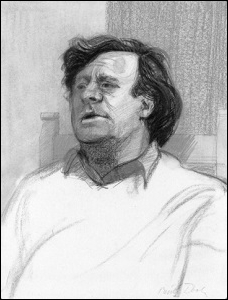
Portret door Rein Dool, 1982
De Vlaamse dichter, schrijver en journalist Thomas Blondeau werd geboren in Poperinge op 21 juni 1978. Zie ook Zie ook alle tags voor Thomas Blondeau op dit blog.
Uit: Donderhart
“Eva twijfelde even maar toen ze Max zag glimlachen, krulden ook haar mondhoeken omhoog. Max stond op, en kuste haar wang. Hij deed een stap naar achter en keek naar haar. Ze was afgevallen. Ze was altijd slank geweest, maar de plooien bij haar ogen en mondhoeken waren nu nog zichtbaarder geworden.
Eva uit zijn gedachten schrappen was niet makkelijk geweest. Ze was al tien jaar zangeres van een band die bij ieder album nog meer platen verkocht en nog meer zalen deed volstromen. Vlak na hun breuk spotte haar roem met zijn liefdesverdriet. Soms nam die hoon paranoïde vormen aan. Was ze even uit zijn aandacht verdwenen, dan hoorde hij opeens haar stem op de radio terwijl de kappersschaar over zijn hoofd gleed. ’s Nachts in de snackbar danste ze op het tv-scherm dat de wachtenden moest vermaken. De etalages van kiosken, de rijen affiches op blinde muren reproduceerden haar bestraffende blik in oneindig veelvoud.
Om het vergeten makkelijker te maken, had Max de muziekzenders van zijn tv gewist. Hij luisterde bijna alleen nog maar naar klassieke muziek en zijn autoradio was zo geprogrammeerd dat het gevaar van opdringerige herinneringen tot een minimum was gereduceerd.
De tijdschriftenkast op de redactie van Criterium kon hij natuurlijk niet censureren. Wanneer er een nieuw album uit was, zag hij een maand lang Eva’s nieuwe look opduiken op de voorpagina van de concurrerende bladen. Hij had geluk dat popmuziek nog steeds zelden toegang vond tot de kolommen van zijn tijdschrift. In de jaren dat Max voor Criterium werkte, was de band slechts één keer door het blad geïnterviewd. Hij had zijn ogen over de tekst laten glijden, zoekend naar woorden als ‘vriendje’, ‘ex’ of ‘lief’ maar kon niks vinden.
Behalve wat oude vrienden wist niemand uit Max’ omgeving van zijn tijd met Eva af. Véronique vertelde hij het pas toen ze elkaar al twee jaar kenden. Eerst geloofde ze het niet. Eens ze overtuigd was, vroeg ze of hij Eva nog wel eens zag. Dat ze een keer langs moest komen. Max snauwde haar af. Véronique was er niet meer over begonnen.
‘Londen, meneer Gosset, dat brengt mij hier. Evenals u, neem ik aan.’ Door Max’ overdreven formele toon over te nemen, gaf ze blijk van een mondigheid die nieuw was voor hem. Bij het uitspreken van zijn achternaam had ze zelfs een kleine buiging gemaakt. Ze had iets smalends, arrogants over zich gekregen. Was het een uitwas van de ijdelheid die vroeger slechts sluimerend bij haar aanwezig was geweest? “
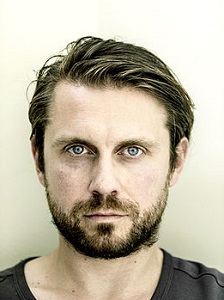
De Poolse dichter en essayist Adam Zagajewski werd geboren op 21 juni 1945 in Lwów, het huidige Lviv. Zie ook alle tags voor Adam Zagajewski op dit blog.
Poetry searches for radiance
Poetry searches for radiance,
poetry is the kingly road
that leads us farthest.
We seek radiance in a gray hour,
at noon or in the chimneys of the dawn,
even on a bus, in November,
while an old priest nods beside us.
The waiter in a Chinese restaurant bursts into tears
and no one can think why.
Who knows, this may also be a quest,
like that moment at the seashore,
when a predatory ship appeared on the horizon
and stopped short, held still for a long while.
And also moments of deep joy
and countless moments of anxiety.
Let me see, I ask.
Let me persist, I say.
A cold rain falls at night.
In the streets and avenues of my city
quiet darkness is hard at work.
Poetry searches for radiance.
Ravenna
This sleepy little town was once the empire’s center.
This baker was Caesar’s baker.
This fire flamed high.
This tailor hunched over cloth of gold.
This oriole sang in the language of the gods.
Ravenna is quiet, botanical.
Thrushes hop over its flat earth.
Bikes chat together casually like deaf-mutes.
A sluggish train from Ferrara enters the station.
Two German girls squabble: how to say solitude?
These bricks touched fingers.
These fingers touched iron and trees.
These acacias climbed romanesque vaults.
Ravenna’s bookmark lies in a herbarium of guidebooks,
and waits, just keeps on waiting.
A golden flame still smoulders in mosaics,
one day it will doubtless go out.
A single match may serve
to kindle it again.
A single moment’s concentration.
Is that so?
Vertaald door Clare Cavanagh
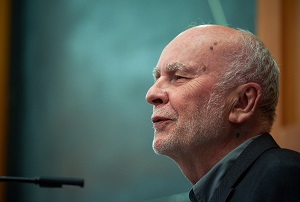
De Canadese dichteres, essayiste en vertaalster Anne Carson werd geboren op 21 juni 1950 in Toronto. Zie ook alle tags voor Anne Carson op dit blog.
Apostle Town
After your death.
It was windy every day.
Every day.
Opposed us like a wall.
We went.
Shouting sideways at one another.
Along the road.
It was useless.
The spaces between us.
Got hard.
They are empty spaces.
And yet they are solid.
And black and grievous.
As gaps between the teeth.
Of an old woman.
You knew years ago.
When she was.
Beautiful the nerves pouring around in her like palace fire.
Short Talk on Major and Minor
Major things are wind, evil, a good fighting horse,
prepositions, inexhaustible love, the way people
choose their king. Minor things include dirt,
the names of schools of philosophy, mood and
not having a mood, the correct time. There
are more major things than minor things
overall, yet there are more minor things
than I have written here, but it is
disheartening to list them. When I
think of you reading this I do not
want you to be taken captive,
separated by a wire mesh lined with glass
from your life itself, like some Elektra.
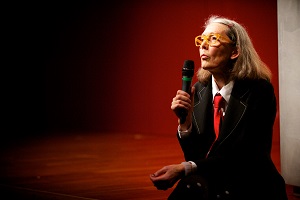
De Britse schrijver Ian McEwan werd op 21 juni 1948 geboren in de Engelse garnizoensplaats Aldershot. Zie ook alle tags voor Ian McEwan op dit blog.
Uit: Nutshell
“So here I am, upside down in a woman. Arms patiently crossed, waiting, waiting and wondering who I’m in, what I’m in for. My eyes close nostalgically when I remember how I once drifted in my translucent body bag, floated dreamily in the bubble of my thoughts through my private ocean in slow-motion somersaults, colliding gently against the transparent bounds of my confinement, the confiding membrane that vibrated with, even as it muffled, the voices of conspirators in a vile enterprise. That was in my careless youth. Now, fully inverted, not an inch of space to myself, knees crammed against belly, my thoughts as well as my head are fully engaged. I’ve no choice, my ear is pressed all day and night against the bloody walls. I listen, make mental notes, and I’m troubled. I’m hearing pillow talk of deadly intent and I’m terrified by what awaits me, by what might draw me in.
I’m immersed in abstractions, and only the proliferating relations between them create the illusion of a known world. When I hear “blue,” which I’ve never seen, I imagine some kind of mental event that’s fairly close to “green”—which I’ve never seen. I count myself an innocent, unburdened by allegiances and obligations, a free spirit, despite my meagre living room. No one to contradict or reprimand me, no name or previous address, no religion, no debts, no enemies. My appointment diary, if it existed, notes only my forthcoming birthday. I am, or I was, despite what the geneticists are now saying, a blank slate. But a slippery, porous slate no schoolroom or cottage roof could find use for, a slate that writes upon itself as it grows by the day and becomes less blank. I count myself an innocent, but it seems I’m party to a plot. My mother, bless her unceasing, loudly squelching heart, seems to be involved.
Seems, Mother? No, it is. You are. You are involved. I’ve known from my beginning. Let me summon it, that moment of creation that arrived with my first concept. Long ago, many weeks ago, my neural groove closed upon itself to become my spine and my many million young neurons, busy as silkworms, spun and wove from their trailing axons the gorgeous golden fabric of my first idea, a notion so simple it partly eludes me now. Was it me? Too self-loving. Was it now? Overly dramatic. Then something antecedent to both, containing both, a single word mediated by a mental sigh or swoon of acceptance, of pure being, something like—this? Too precious. So, getting closer, my idea was To be. Or if not that, its grammatical variant, is. This was my aboriginal notion and here’s the crux—is. Just that. In the spirit of Es muss sein. The beginning of conscious life was the end of illusion, the illusion of non-being, and the eruption of the real. The triumph of realism over magic, of is over seems. My mother is involved in a plot, and therefore I am too, even if my role might be to foil it. Or if I, reluctant fool, come to term too late, then to avenge it.”
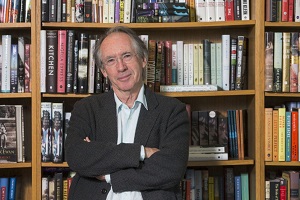
De Israëlische schrijver Alon Hilu werd geboren op 21 juni 1972 in Jaffa. Zie ook alle tags voor Alon Hilu op dit blog.
Uit: Death of a Monk
“I would bathe alone, never at the hammam in Kharet Elyahud, the Jewish Quarter, with the other men, but with a bucket of hot water in the room at the edge of the fruit orchards, so that no unfamiliar eye could catch sight of me, and I could gaze in wonder at my feeble body: the pale and bloated belly, which had not seen a ray of sunlight for some time and was always hidden under thick clothing; the toes, as separate and distant from one another as a band of brothers in hot dispute; the brittle fingers, unfit for labour, mottled pink and red; the shoulders, made like two marbles that roll and sway in every direction. And in summertime, when a tardy sunbeam flickered suddenly through the window and lit up the small room, tiny pores that covered my skin in flocks would reveal themselves and I would regard them without comprehending their meaning. The long days and weeks when Father was absent from the city, travelling to Aleppo or Sidon and from there by ship across the sea, were my moments of happiness and pleasure; upon returning from the Talmud Torah school, when my evil and angry sister had turned her blue eyes to her games and my little brother was preoccupied with matters in his room, I would circle the large apricot tree that stood in the centre of the alkhosh, tossing crumbs of bread to the goldfish sailing the fish pond at the foot of the tree, and then with hesitation tinged with anticipation I would ask one of the servants to request an audience for me with Maman, and when the response came — that she awaited me in her room — I would walk slowly to her, close the door behind me, and give myself over to her cursory kisses and sugary hugs. Then we would spread about the costly bolts of fabric she had had sent by special delivery from shops in Europe, and alongside them garments and dresses she had obtained from sharp-eyed local traders or from the travelling merchants who sometimes visited our estate. “
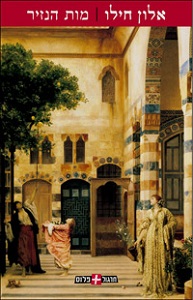
Cover Israëlische uitgave
De Franse schrijver Jean Paul Sartre werd geboren op 21 juni 1905 in Parijs. Zie ook alle tags voor Jean-Paul Sartre op dit blog.
Uit: Huis clos
“GARCIN Vipère ! Tu as réponse à tout.
INÈS Allons ! allons ! Ne perds pas courage. Il doit t’être facile de me persuader. Cherche des arguments, fais un effort. (Garcin hausse les épaules.) Eh bien, eh bien ? Je t’avais dit que tu étais vulnérable. Ah ! comme tu vas payer à présent. Tu es un lâche, Garcin, un lâche parce que je le veux. Je le veux, tu entends, je le veux ! Et pourtant, vois comme je suis faible, un souffle ; je ne suis rien que le regard qui te voit, que cette pensée incolore qui te pense. (Il marche sur elle, les mains ouvertes.) Ha ! elles s’ouvrent, ces grosses mains d’homme. Mais qu’espères-tu ? On n’attrape pas les pensées avec les mains. Allons, tu n’as pas le choix : il faut me convaincre. Je te tiens.
Garcin ! Quoi ? Venge-toi. Comment ?
ESTELLE Garcin !
GARCIN Quoi?
ESTELLE Venge-toi.
GARCIN Comment?
ESTELLE Embrasse-moi, tu l’entendras chanter.
GARCIN
C’est pourtant vrai, Inès. Tu me tiens, mais je te tiens aussi. Il se penche sur Estelle. Inès pousse un cri. INÈS Ha ! lâche ! lâche ! Va ! Va te faire consoler par les femmes.
ESTELLE Chante, Inès, chante !
INÈS Le beau couple ! Si tu voyais sa grosse patte posée à plat sur ton dos, froissant la chair et l’étoffe. Il a les mains moites ; il transpire. Il laissera une marque bleue sur ta robe.
ESTELLE Chante ! Chante ! Serre-moi plus fort contre toi, Garcin ; elle en crèvera. INÈS Mais oui, serre-la bien fort, serre-la ! Mêlez vos chaleurs. C’est bon
l’amour, hein Garcin ? C’est tiède et profond comme le sommeil, mais je t’empêcherai de dormir.
Geste de Garcin.
ESTELLE Ne l’écoute pas. Prends ma bouche ; je suis à toi tout entière.”
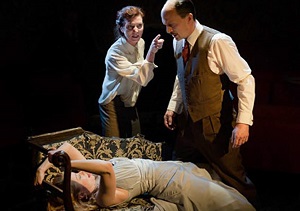
Scene uit een opvoering in Londen, 2012
De Amerikaanse dichter, uitgever en kunsthandelaar Stanley Moss werd geboren in Woodhaven, New York op 21 juni 1925. Zie ook alle tags voor Stanley Moss op dit blog.
Paper Swallow
Francisco Goya y Lucientes,
I dedicate this paper swallow to you and fly it
from the balcony of San Antonio de la Florida
past the empty chapels of the Four Doctors of the Church.
My praying hands are fish fins again,
one eye a lump of tar, the other hard blood,
my flapping lids sewed down to my cheekbones.
Time, the invisible snake, keeps its head
and fangs deep in the vagina of space.
Reason blinded me, banished me.
I fight the liar in me, selective desire,
my calling nightmares ‘dreamless sleep.’
Blind, coño, I made a musical watch,
the image of Don Quixote points the hours,
Sancho the minute hand. I hear the right time
when I listen to my watch play church bells.
Mystery this, mystery that.
I have another watch—wolves howling and dogs barking.
Now the invisible snake swims in the Ebro.
I look out of my window to see time
as if it were not in my mouth
and all my other two-timing orifices.
Don Francisco, I swear at the feet of the dead who maim me
and the living who heal me that the least sound,
a page turning, whips me. I owe my blindness,
this paper swallow, to you, because I lived
most of my life, a marrano, in your deaf house.
I pull open one of my eyes like the jaws of a beast.
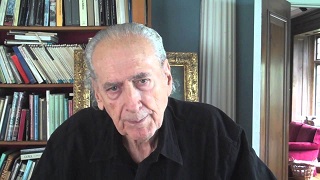
De Braziliaanse schrijver Joaquim Maria Machado de Assis werd geboren in Rio de Janeiro op 21 juni 1839. Zie ook alle tags voor Machado de Assis op dit blog.
Uit: The Posthumous Memoirs of Brás Cubas (Vertaald door Gregory Rabassa)
“As it so happened, one day in the morning while I was strolling about my place an idea started to hang from the trapeze I have in my brain. Once hanging there it began to wave is arms and legs and execute the most daring antics of a tightrope-walker that anyone could imagine. I let myself stand there contemplating it. Suddenly it took a great leap, extended its arms and legs until it took on the shape of an X: decipher me or I’ll devour you.
That idea was nothing less than the invention of a sublime remedy, an antihypochondriacal poultice, destined to alleviate our melancholy humanity. In the patent application that I drew up afterward I brought that truly Christian product to the government’s attention. I didn’t hide from friends, however, the pecuniary rewards that would of needs result from the distribution of a product with such far-reaching and profound effects. But now that I’m on the other side of life I can confess everything: what mainly influenced me was the pleasure I would have seeing in print in newspapers, on store counters, in pamphlets, on street corners, and, finally, on boxes of the medicine these three words: Brás Cubas Poultice. Why deny it? I had a passion for ballyhoo, the limelight, fireworks. More modest people will censure me perhaps for this defect. I’m confident, however, that clever people will recognize this talent of mine. So my idea had two faces, like a medal, one turned toward the public and the other toward me. On one side philanthropy and profit, on the other a thirst for fame. Let us say:–love of glory.
An uncle of mine, a canon with full prebend, liked to say that love of temporal glory was the perdition of souls, who should covet only eternal glory. To which another uncle, an officer in one of those old infantry regiments called tercos, would retort that love of glory was the most truly human thing there was in a man and, consequently, his most genuine attribute.
Let the reader decide between the military man and the canon. I’m going back to the poultice.”
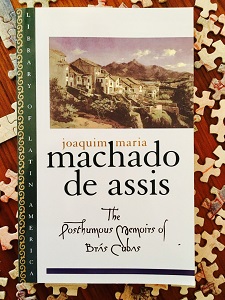
Cover
Zie voor nog meer schrijvers van de 21e juni ook mijn blog van 21 juni 2016 en ook mijn blog van 21 juni 2014 deel 1, en deel 2 en eveneens deel 3.
